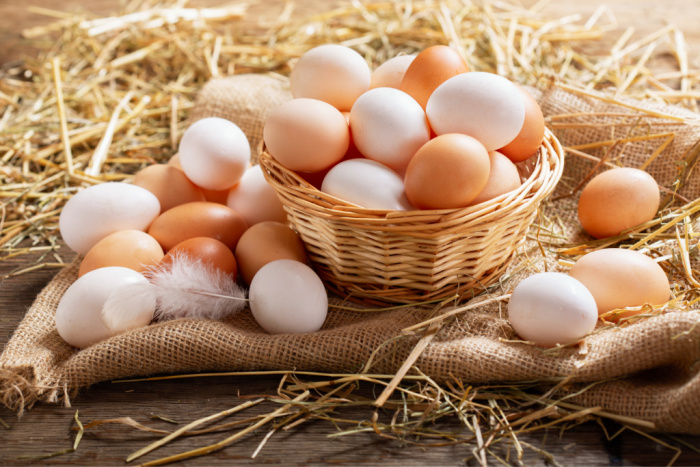
Let’s talk about how to freeze eggs today! For some of you, it may be a surprise that you can freeze your extra eggs. Yes, you can keep them much longer than their use-by date. You may have known this for food products but weren’t sure how to properly do so for eggs.
You may start to think, but what if the power goes out? Well, they will make a great breakfast scrambled in a frying pan outside on a Volcano Stove (which can use three fuel types)! They can also make omelets outside or a breakfast casserole in a Dutch Oven!
When done right, your frozen eggs will have the same taste and texture as when you first bought them. However, I’ll have to warn you that you won’t be able to enjoy your eggs sunny side up. But you can still enjoy them scrambled, in an omelet, or in almost any other recipe calling for eggs.
Related: Powdered Eggs: Everything You Need to Know
How to Freeze Eggs: Everything You Need to Know

There may be a number of reasons why you’d want to freeze your eggs. Perhaps you’re not shopping as often due to the recent weather issues, you’ve found an amazing deal on eggs so you buy lots of eggs, or you simply want to avoid the risk of running out when particular recipe dishes call for them.
Some people don’t use them up fast enough. Fortunately for you, it’s straightforward to freeze eggs and preserve them for a longer period. Here’s how to freeze your eggs, along with other answers to other egg-related questions.
Benefits of Freezing Eggs
Some of these I’ve already pointed out, but freezing eggs gives you more flexibility in when and how to use your eggs. For starters, it saves you money when you find a great deal. It can also save you on prepping time when you already have them mixed and ready to use.
Freezing eggs also frees up space in your refrigerator and provides an extra supply so you don’t run out of eggs.
Which Container Do I Use?
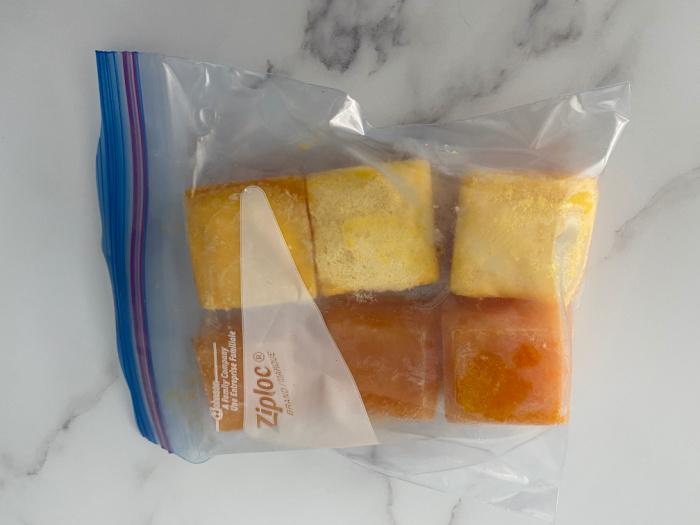
There are several different ways to store your frozen eggs. You can use a Ziploc freezer bag, sealable freezer containers, or ice tray. It’s really up to you which method you prefer to use. Souper Containers or Silicone Containers.
Freezing Methods
I froze the whole egg for the next few pictures and rarely use egg yolks or egg whites separately.
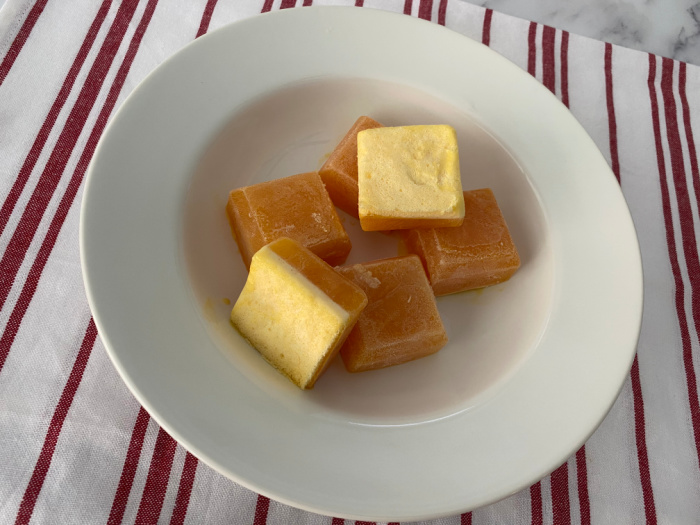
There’s more than one way that you can freeze your eggs safely and properly. Some people freeze the whole egg like I did, while others freeze the yolk and the egg whites separately.
Freezing Whole Eggs
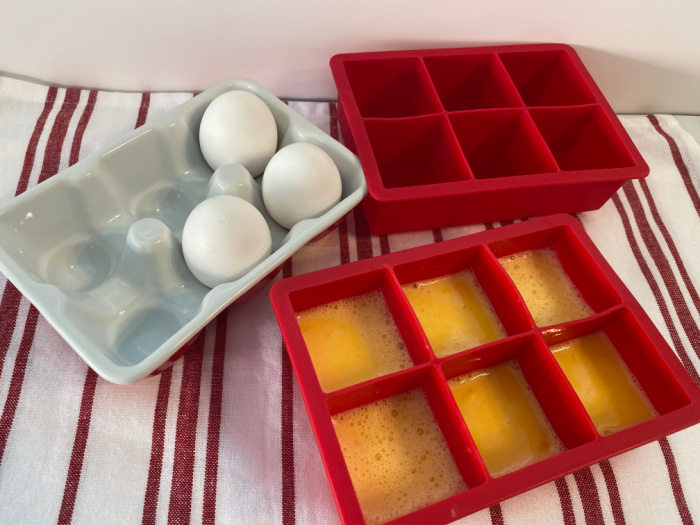
In order to properly freeze a whole egg, all you need to do is use a whisk to mix them gently in a mixing bowl and place them in a lightly greased ice cube tray, or in a freezer-safe bag or container. If you’re dealing with a lot of recipes that are only calling for an individual egg, you can just pull one egg from the container and put the rest back in the freezer. Be sure and use a vegetable spray when using silicone containers or ice trays.
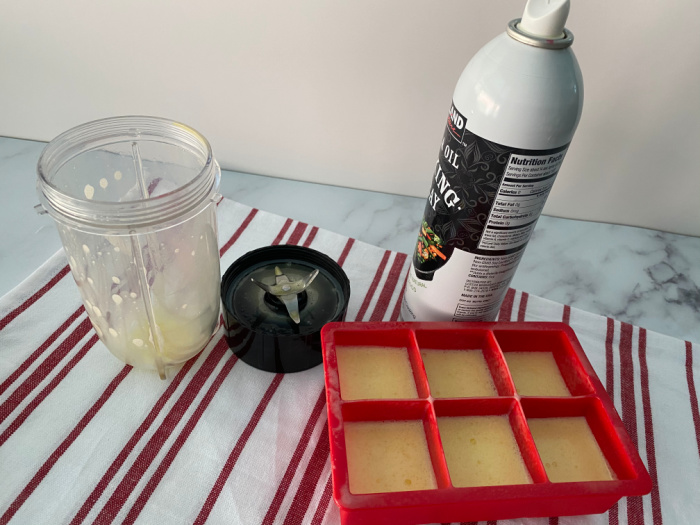
For me, it makes more sense to use an ice cube tray that can keep them separated. Once frozen, it’s okay to move them to a single Ziploc bag or container to help with space. These are similar to the silicone containers I used: Silicone Containers
Freezing Egg Yolks
Freezing egg yolks and egg whites is also easy. Once they have thawed, it really only depends on how you plan on using them. Doing so can also give you more flexibility for certain recipes.
If you’re cooking with them, you only need to add a pinch of salt to prevent them from thickening while they’re frozen.
If you’re thinking about using your eggs for baking delicious desserts, add 1 ½ teaspoons of sugar to each egg yolk and place them in an individual ice tray or a freezer-safe bag or container.
Freezing Egg Whites
Egg whites freeze well when placed individually in an ice cube tray. Once they’ve frozen separately, it’s okay to combine them in a freezer-safe container or bag.
Can You Freeze Hard-Boiled Eggs?
No, just to put it bluntly. Hard-boiled eggs can last in your refrigerator for up to one week but shouldn’t be stored in your freezer. If you do, you’ll discover that the egg white becomes rather rubbery, and the yolk becomes more powdery than an edible solid.
Thawing Your Eggs
Thawing your eggs is rather simple. All you need to do is move them to your refrigerator, where they will remain cool. Resist the temptation of thawing your eggs at room temperature. Doing so can allow harmful bacteria to grow. Just remember to label your bag of eggs ahead of time so that you know how many eggs you used and any seasonings you may have already put in them.
How Long Will They Last?
Chicken eggs can last up to a year in your freezer, making them an important protein option and ingredient to have on hand, especially during an emergency. Eggs that have already been cooked will last between 2 and 3 months.
What Size Eggs Are Best to Freeze?
It’s really a personal preference, but I like to freeze large or extra-large eggs. They typically don’t cost much more and most recipes call for the equivalent of large eggs. I always try to freeze my eggs when I have fresh eggs rather than let them get too old. It may just be me, but I feel my recipes turn out much better when I use fresh ingredients.
Final Word
The answer is no if you’re still wondering whether you can freeze a whole egg in its shell. Doing so can cause the shell to crack and you’ll have more of a mess to deal with. You’ll also find out that freezing eggs this way can cause the yolk to become too syrupy and thick. The consistency in your recipes won’t turn out how you like it.
In what ways would you find it helpful in order to freeze and store your eggs for later use? What did you think about freezing eggs? Thanks for thinking of new ways to be prepared. May God bless this world. Linda
Copyright Images: Eggs Fresh In A Basket AdobeStock_274753711 by Nitr
The post How to Freeze Eggs: Everything You Need to Know appeared first on Food Storage Moms.
from Food Storage Moms
No comments:
Post a Comment